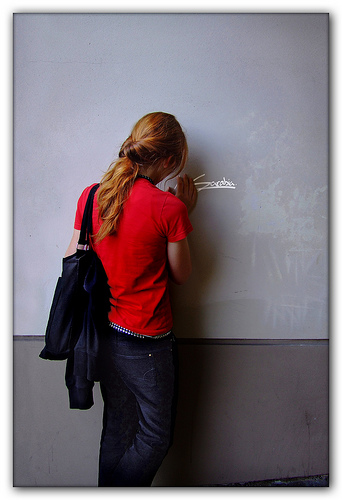How to Deal with Writer’s Block
Today’s guest post is by Dom Principe:
So, you’ve got your new story idea mapped out, the characters are fleshed and ready to come to life, and all your plot points are set. You excitedly sit down at your desk, and for the next two hours . . . stare at your computer screen. You have been hit by the bane of every writer’s existence: writer’s block.
What Is It?
Writer’s block is a condition that was first described by psychoanalyst Edmund Bergler as “a neurotic inhibition of productivity in creative writers.” That sounds simple enough, but as every writer who has experienced it knows, writer’s block is never simple.
Basically, writer’s block is when the mind is under stress, and it switches from the cerebral cortex (which is the part of the brain that deals with memory, awareness, and consciousness) to the limbic system (which reacts to adversity by fight or flight). That switch-over blocks your ability to access the creative side of your brain.
Dos and Don’ts
So, you’re probably thinking, “I know what writer’s block is, but how do I deal with it?” Well, if you accept the theory that writer’s block is caused by a flip being switched in your mind brought on by stress, then you have a number of options.
- Take a walk. Get away from what’s causing you the stress, and let your mind relax.
- Take a bath. Unwind and soak.
- Take a nap. A power nap can bring on amazing ideas.
- Listen to music.
- Cook something.
- Basically, do anything that you enjoy that helps you unwind.
There are also some things you shouldn’t do when trying to deal with writer’s block. You see, the whole point of relaxing your mind is to cause your thoughts to start flowing again. Which means that you don’t want other people’s thoughts intruding.
So, don’t do things like these:
- Go to a party. Way too loud, way too many people with thoughts meddling with yours!
- Make phone calls.
- Indulge in chatting on social media sites
- Do anything that causes other people’s thoughts to encroach on your own.
Remember that everybody thinks differently. What works for one person won’t for another and vice-versa. Just remember, the goal is to lower stress so your cerebral cortex takes back over, and your creative juices start flowing again!
Hacking Your Dreams
It doesn’t work! You mean that you got yourself loosened up, and the creative juices still won’t flow? Okay. Here’s a simple trick for you: write as soon as you wake up!
Here’s the thing. When you first wake up, your mind is coming out of theta state. That’s when you’re in REM sleep and your brain is extremely active. During this time, your mind is able to produce mental images that are much clearer than when you’re fully awake. Think of how vivid your dreams are. Well, when you’re in theta state, you can still access that aspect of your brain that creates those vivid dreamscapes.
Another way to break through the creative barrier is to use your dreams. Try writing for fifteen to twenty minutes before bedtime. By doing this right before you sleep, you might find that what you write will slip into your subconscious. Even if you don’t consciously remember your dreams, it doesn’t matter. The ideas will be there flourishing within your vivid dreaming mind as you sleep. So, once you wake up, grab your pen and pad again, and see how your ideas developed over the course of the night. You might be pleasantly surprised.
Discipline
The one thing that separates all masters of writing from wannabes is discipline! Master writers didn’t get where they are by letting things—even writer’s block—stop them. They put in the time, they honed their skills, and they wrote!
It doesn’t matter if you only write a hundred words, or if you write five hundred and find that they’re all useless. What matters is that you discipline yourself to write. Trust me, I get it. Life isn’t easy. There are always things that seem to come up, things that seem to get in the way.
Quality writing isn’t easy either. It takes years of persistent work to reach a point where you can truly consider yourself a master, because there is always something that you can learn and improve.
When you write, you are using your brain, and the brain is a muscle like any other. The more you exercise it, the stronger it gets. So, if you want to be a great writer, then you need to work it out. Take time every day, even if it’s only fifteen to twenty minutes, and write. That way, when writer’s block hits you, you will have the discipline necessary to, if not overcome it at once, at least power through it.
I will leave you with one of my favorite quotes by an author named Lilli St. Crow:
“Discipline allows magic. To be a writer is to be the very best of assassins. You do not sit down and write every day to force the Muse to show up. You get into the habit of writing every day so that when she shows up, you have the maximum chance of catching her.”
 Dom Principe is an Internet marketer and English teacher who lives and works in China. He has degrees in psychology, education, and writing arts. You can usually find him with his nose buried in a sci-fi book. Learn more about Dom at his company website. Check out Dom’s upcoming collaborative work The Archer’s Theory, and read a free chapter today!
Dom Principe is an Internet marketer and English teacher who lives and works in China. He has degrees in psychology, education, and writing arts. You can usually find him with his nose buried in a sci-fi book. Learn more about Dom at his company website. Check out Dom’s upcoming collaborative work The Archer’s Theory, and read a free chapter today!












This is excellent advice, Dom. There was also that one scene in Finding Forrester where Sean Connery’s character (who was the master writer in the movie) that one of many techniques to do (as you’ve somewhat touched on here) in this article is to start copying what another writer has written in their previously published work…just to get the juices flowing.
Of course, not to actually ever do anything with that writing, because that would be plagiarizing, but it could get the gears moving for at least breaking into one’s own original ideas.